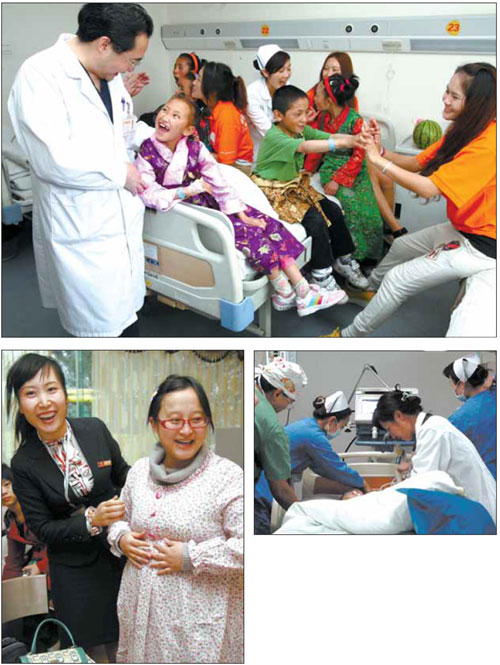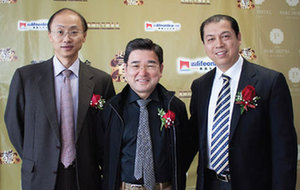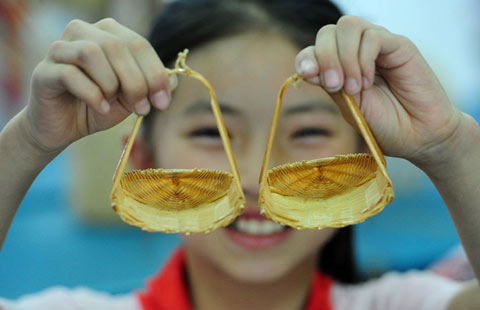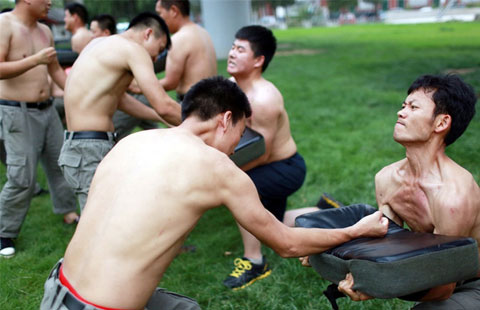From 'Barefoot' doctors to medical pioneers
Updated: 2014-06-17 08:04
By Sun Li and Hu Meidong (China Daily USA)
|
||||||||
China's hospitals have been revolutionized by a group of former low-level practitioners from a small city in Fujian province, report Sun Li and Hu Meidong in Fuzhou.
Many readers will be familiar with the image of a pretty nurse with a sweet smile who adorns ads in newspapers, on television and the Internet, among other places, promoting the service of hospitals that offer cosmetic surgery and treatments for skin conditions and infertility.
However, less well-known is the fact that these same hospitals are run by a group of billionaires from Putian, a prefectural-level city in Fujian province, and a large number of them are even from the same town.
Statistics from the National Health and Family Planning Commission show that as of October, 10,877 private hospitals were operating in China, and of those, about 8,000 were run by people from Putian, where more than 60,000 residents are engaged in the medical and healthcare industries.
Their habit of crisscrossing the country to conduct their businesses has even led to a nickname: "the itinerant physicians of Putian".
The story began with Chen Deliang, a 64-year-old resident of Dongzhuang town, which lies within the boundaries of Putian. Chen, whose grandfather was a physician, gained some basic knowledge of traditional Chinese medicine as a child. Then, from the age of 20, he moved around various cities and worked as a "barefoot doctor", providing basic, but essential, medical treatment for people in remote rural areas.
In the early 1980s, during a stint in Guangzhou, Guangdong province, an experienced barefoot doctor taught Chen a special treatment for scabies, a painful, infectious condition caused by mites that burrow under the skin. At the time, scabies was widespread and extremely difficult to cure, but the treatment, which used a combination of nitric acid, mercury and vinegar, turned out to be an effective weapon in the barefoot doctors' arsenal, Chen recalled.
The medicine, which sold for 2 yuan (32 US cents) a bottle cost only 0.2 yuan to make. Its popularity meant that Chen could make about 200 yuan a day at a time when public servants earned about 30 yuan a month.
Chen's rapidly expanding fortune resulted in an ever-increasing number of people in Dongzhuang town beating a path to the young man's door to learn the recipe.
Eight students attended Chen's first classes, including Zhan Guotuan and Huang Defeng, both of whom are now tycoons in the private-hospital industry.
The students passed their knowledge on to other people and the resultant ripple effect resulted in a large number of people in Putian learning the skill.
The trend was also noticed by the authorities, who began offering medical courses in the city and ordered the "itinerant physicians" to return to the city to pursue their studies and pass an exam before they were allowed to work as semi-qualified practitioners, although none has the right to call him or herself a physician.
"The certificate issued by the authorities provided official credentials for me and my followers to visit different provinces and treat patients," Chen said.
National spotlight
However, it was their treatment of sexually transmitted diseases that catapulted Putian's itinerant physicians into the national spotlight. In the 1990s, as prostitution became more visible in China, incidences of sexually transmitted diseases began to rise, but few public hospitals had facilities to treat the conditions. Moreover, even when clinics could offer treatment, many patients were too embarrassed to register under their real names, Chen said.
That combination of circumstances allowed the Putian physicians to break into the STD market. They established small clinics in alleyways across the country and glued their ads, which highlighted the phrase "keeping patients' secrets", to lampposts, not notice boards, he added.
In an interview with the magazine Entrepreneur, published in April, Zhan Guotuan said that given the huge potential profits in the medical market, the Putian physicians were simply not satisfied running small clinics.
In the 1990s, they formed companies and started to sign contracts with public hospitals to run specific departments, such as andrology - or male, and especially sexual, health - and dermatology, Zhan said.
Although the mode, known as the "hospital within a hospital" system, was copied countless times across the nation, the uniformly high treatment costs provoked controversy.
In 1998, Wang Hai, a vigilante consumer advocate, launched a probe into the medical sector, and later published a report in which he claimed that the practitioners from Putian sold 10-yuan bottles of STD treatment for 200 yuan.
The report also questioned their eligibility and qualifications after healthy patients were diagnosed with STDs in the "hospital within hospital" system.
Wang's investigation was followed by a series of media reports that exposed fraudulent activities in hospital departments operated by Putian-based entrepreneurs in a number of cities, and concluded that the episodes had severely damaged the credibility of public hospitals.
In 2000, the State Council issued guidelines forbidding public hospitals from signing "hospital within a hospital" contracts or cooperating on projects with the companies.
However, the policy change failed to derail the activities of the entrepreneurs, who further expanded their influence in the country's medical sector by buying public hospitals and setting up private centers.
According to an article published by the magazine Business in October 2013, Zhan Guotuan had an interest in more than 30 private hospitals, while Huang Defeng owned about 30 maternity hospitals in Beijing, Tianjin, and in Hebei province.
Although the number of privately owned hospitals didn't lag far behind public institutions in 2012, the number of patients who used them accounted for just 9 percent of total consultations, according to the then-ministry of health.
Chen Lujiang, a surgeon at Fuxing Hospital, a private establishment with connections to Putian, said his workload is far lighter than that of his peers in public hospitals because so few of his patients need to stay in the hospital.
The disparity in patient numbers resulted in private hospitals focusing on specific departments, said Chen Donghai, an executive with the Fuzhou-based Gulou Hospital, a private establishment owned by Zhan Yupeng, a relative of Zhan Guotuan.
Building the brand
In addition to andrology and gynecology, the traditional preserves of private medicine, non-State hospitals have now started to home in on other departments such as orthopedics, dentistry and ophthalmology, fields that are highly profitable and have extremely low fatality rates, according to Chen Donghai.
More importantly, these sectors aren't included in the national medical insurance system, so patients tend to choose private hospitals that specialize in those categories, he said.
To build the brand, these new facilities have been publicized via new media outlets such as Sina Weibo, a Twitter-like micro-blogging platform, and WeChat, a popular mobile social networking platform.
In recent years a number of policies favorable to private hospitals have also been released.
In 2009, the State Council issued a circular to encourage private capital to set up hospitals. A year later, to promote the development of private hospitals, the government published proposals to gradually abolish restrictions on the amount of equity that foreign capital is allowed to own in each project.
In April, the State Council gave private hospitals the right to set prices for diagnoses and treatments, processes that had previously been government-controlled.
Against such a backdrop, it's unsurprising that building the brands of private hospitals and clinics has been high on the agenda of Putian's medical entrepreneurs. For example, Zhuo Chaoyang has been busy attempting to build his establishment, the Angel Hospital in Chengdu, the capital of Sichuan province, into a high-profile hospital for obstetrics and gynecology since 2008.
Meanwhile, Chen Xinxian, another Putian-based healthcare tycoon, has been building the brand of Sacred Pearl Dental, a chain of dental clinics, since 2010. In November, Weng Guoliang, a prominent Putian player in the healthcare industry, combined with Liu Yonghao, chairman of New Hope Group, a leading Chinese agribusiness company, and Feng Lun, the chairman of the real estate company Vantone, to form The Strategic Alliance for the Medical and Healthcare Industry of China, which aims to become the nation's leading hospital and healthcare management corporation.
The alliance, which comprises eight Putian medical entrepreneurs who control about 1,000 hospitals nationwide, has recently had its 10 billion yuan credit line extended by PingAn Bank.
Xie Qilin, a researcher with the nonprofit Chinese Medical Doctor Association, said the boom in private hospitals could promote the reform of public hospitals, because a wider range of institutions will heighten competition in the healthcare sector.
When asked how he felt about the performance of his "descendants", Chen Deliang said he hoped the entrepreneurs from Putian will improve the quality of medical services nationwide, and called for their previous misbehavior to be forgiven and forgotten. "The 'page of notoriety' should be turned over now," he said.
Contact the authors at sunli@chinadaily.com.cn and humeidong@chinadaily.com.cn
|
Clockwise from top: Staff and volunteers hold a birthday party for five children at Shanghai Yuanda Hospital. A 9-year-old patient is taken to the ICU after undergoing heart surgery in Shanghai Yuanda Hospital. An expectant mother at the Angel Hospital in Chengdu, Sichuan province. All the hospitals are run by Putian-based healthcare tycoons. Wang Rongjiang / for China Daily Dong Jun / for China Daily Huang Jiaming / for China Daily |

(China Daily USA 06/17/2014 page7)

 Delta launches nonstop Seattle-Hong Kong flight
Delta launches nonstop Seattle-Hong Kong flight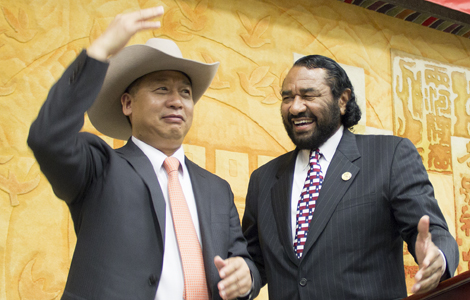
 Consul general welcomed
Consul general welcomed
 Developer of Alibaba film in talks for US TV screening
Developer of Alibaba film in talks for US TV screening
 Opera explores death of a Chinese-American soldier
Opera explores death of a Chinese-American soldier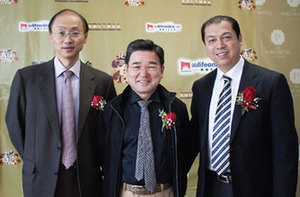
 Popular Chinese TV show expands auditions to US
Popular Chinese TV show expands auditions to US
 World Cup fever grips Chinese soccer fans
World Cup fever grips Chinese soccer fans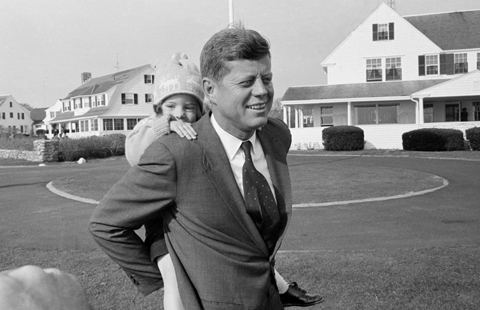
 Tender moments of world leaders with their children
Tender moments of world leaders with their children
 Chinese fleet joins others for RIMPAC exercise
Chinese fleet joins others for RIMPAC exercise
Most Viewed
Editor's Picks

|

|

|

|

|
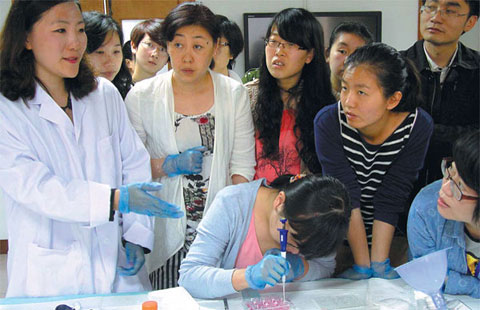
|
Today's Top News
China lowers US debt for third straight month
China's Alibaba submits updated prospectus
Turmoil in Iraq 'certain to affect China oil prices'
US Navy ship with 550 Marines entering Gulf
US should 'attune itself to China's rise'
China blasts comments on S China Sea controversy
US hay helping China's dairy needs
Straits ties to expand despite pact suspension
US Weekly

|

|
